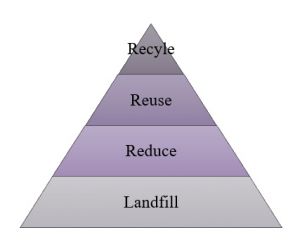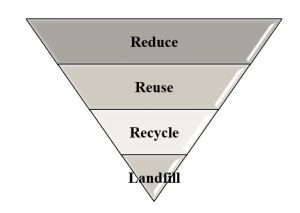It is anticipated that the University will incorporate best practices into the daily activities to improve safety practices, minimize energy and fuel consumption, and eliminate solid and hazardous waste.
Purpose
It is anticipated that the University will incorporate best practices into the daily activities to improve safety practices, minimize energy and fuel consumption, and eliminate solid and hazardous waste.
Definitions
Defining the current waste management practice at the university;

Landfilling: Most of the solid waste collected from all campuses premises is collected by private contractors and disposed of in Askar landfill. The Landfill is managed by the Ministry of Municipality and Urban Planning.
Reduce: The University follows a strategy to reduce the use of papers by the introduction of Correspondence management system DocuTRAK. In addition, the university courses materials are provided through online platforms, such as blackboard or online access to the softcopy version of the textbook. The use of plastic water bottles has been reduced by provided free water sources through water coolers distributed around different buildings.
Reuse: The reuse of waste generated through different activities, such as conferences, student’s activities … etc. The material produced like wood and metals is reused again. The old electronic equipment, computers and furniture are excluded and handled by the Assets Department, and then sold to relevant companies dealing with used stuff.
The university Sewerage treatment plant treats wastewater from the university premises and the treated water is stored and used mainly for irrigation.
Hazardous Waste: The university adheres to the supreme council for environmental legislation regarding handling and the disposal for hazardous waste.
Recycle: Exam papers and official papers are handled by the Security and Safety Directorate at the university. The paper is shredded and recycled through a private contractor. The agricultural waste is collected by another contractor dealing only with this type of waste for purposes, such as fertilisers.
Scope/Application
3.1 The policy applies, as outlined below, to the management of different types of solid and liquid waste generated at the university three campuses;
a) Solid Waste
- Residential waste
- Offices waste
- Food courts waste
- Agriculture waste
b) Hazardous waste
- Chemical waste
- Biological waste
c) Liquid waste
- Sewerages
- Water Run-off
- Provide legislation solution to waste production and handling at the University of Bahrain.
- Demonstrate a good practice of waste management in the Kingdom of Bahrain.
- Raise community environmental awareness and responsibility.
Policy Statement and Principles
1. The University is committed to the implementation of the following:
- An effective and responsible waste management process.
- Adhere to the waste hierarchy shown below, focusing the effort to ensure preventing waste being produced, reuse items and segregate materials for recycling.

- It is the responsibility of staff and student to ensure that the waste they produce is disposed of in compliance with the University’s waste disposal procedures.
- As part of their induction, all new staff members and students should receive training in waste disposal procedures.
2. The Policy, accountability and evaluation
- The University shall develop indicators and measures of success in the implementation of this policy.
- A committee formed by the president shall provide an annual report to the university council on the process toward the established indicators and measure of Waste Management Policy.




